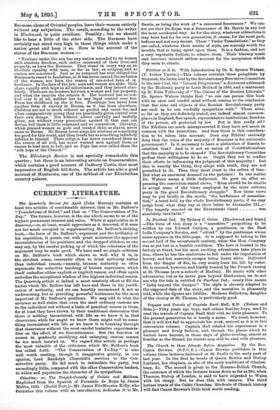Nihilism as It Is. With Introduction by Dr. R. Spence
Watson. (T. Fisher Unwin.) —This volume contains three pamphlets by Stepniak, the letter sent by the Revolutionary Executive Committee to the new Czar, the "Liberal Programme," a document addressed by the Moderate party to Loris Melikoff in 1880, and a statement by M. Felix Volhovsky of "The Claims of the Russian Liberals." Dr. Spence Watson thinks that "no one can peruse this book with an open and candid mind without coming to the conclusion that the aims and objects of the Russian Revolutionary party are such as he can cordially sympathise with." These aims, so far as they are definitely stated, are indeed almost common- places in England, free speech, representative institutions, freedom of the person, all protected by law. But is this really all ? The Nihilists are much misrepresented if they have not much in common with the Anarchists. And then there is this considera- tion to be taken into account. Does any Nihilis!; seriously deny that the voice of the majority of Russians is for autocratic government ? Is it necessary to have a plebiscitum of Russia to establish that? And is it not an axiom of Constitutionalism that the majority is to be obeyed ? The Revolutionary Committee profess their willingness to do so. Ought they not to confine their efforts to influencing the judgment of this majority ? But this is exactly the thing, they allege with truth, they are not permitted to do. Then they must trust to the action of time. But what an enormous demand on the patience ! In one matter Dr. Watson seems a little indiscreet. He goes on, after ex- pressing the conviction stated above, "Even should he be unable to accept some of the views employed by the more extreme party in the great Revolutionary struggle." Now these views may be put briefly in the words, "the lawfulness of assassina- tion," a tenet held by the whole Revolutionary party, if we may judge from what they say in their letter to Alexander
The tragedy enacted on the Ekaterinski Canal was absolutely inevitable."






































 Previous page
Previous page